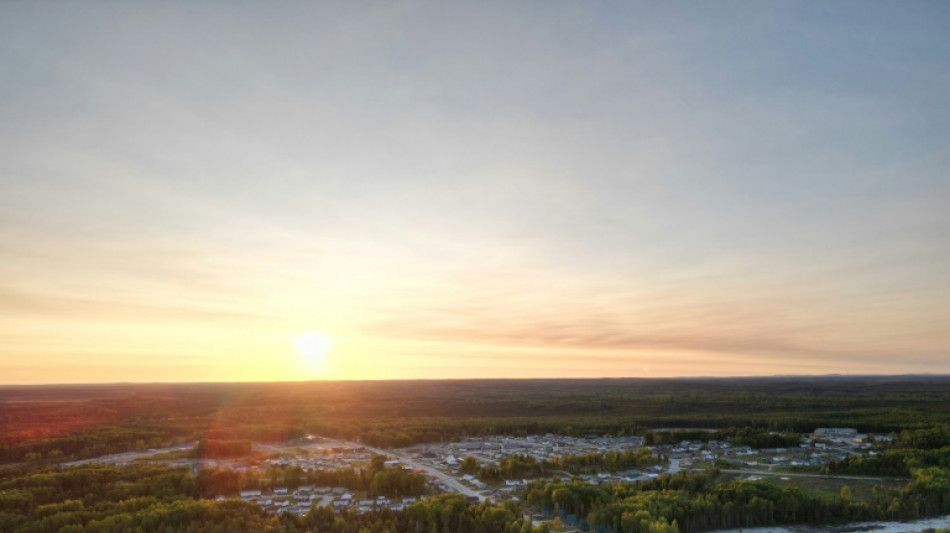
-
 Japan election results confirm super-majority for Takaichi's party
Japan election results confirm super-majority for Takaichi's party
-
Unions rip American Airlines CEO on performance

-
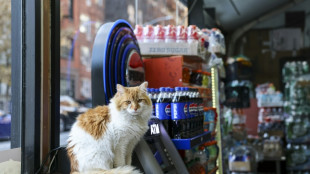 New York seeks rights for beloved but illegal 'bodega cats'
New York seeks rights for beloved but illegal 'bodega cats'
-
Blades of fury: Japan protests over 'rough' Olympic podium

-
 Zelensky defends Ukrainian athlete's helmet at Games after IOC ban
Zelensky defends Ukrainian athlete's helmet at Games after IOC ban
-
Jury told that Meta, Google 'engineered addiction' at landmark US trial

-
 Despite Trump, Bad Bunny reflects importance of Latinos in US politics
Despite Trump, Bad Bunny reflects importance of Latinos in US politics
-
Australian PM 'devastated' by violence at rally against Israel president's visit
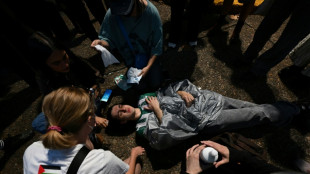
-
 Vonn says suffered complex leg break in Olympics crash, has 'no regrets'
Vonn says suffered complex leg break in Olympics crash, has 'no regrets'
-
YouTube star MrBeast buys youth-focused banking app

-
 French take surprise led over Americans in Olympic ice dancing
French take surprise led over Americans in Olympic ice dancing
-
Lindsey Vonn says has 'complex tibia fracture' from Olympics crash

-
 US news anchor says 'hour of desperation' in search for missing mother
US news anchor says 'hour of desperation' in search for missing mother
-
Malen double lifts Roma level with Juventus

-
 'Schitt's Creek' star Catherine O'Hara died of blood clot in lung: death certificate
'Schitt's Creek' star Catherine O'Hara died of blood clot in lung: death certificate
-
'Best day of my life': Raimund soars to German Olympic ski jump gold

-
 US Justice Dept opens unredacted Epstein files to lawmakers
US Justice Dept opens unredacted Epstein files to lawmakers
-
Epstein taints European governments and royalty, US corporate elite

-
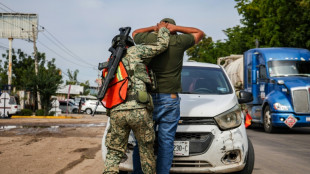 Three missing employees of Canadian miner found dead in Mexico
Three missing employees of Canadian miner found dead in Mexico
-
Meta, Google face jury in landmark US addiction trial

-
 Winter Olympics organisers investigate reports of damaged medals
Winter Olympics organisers investigate reports of damaged medals
-
Venezuela opposition figure freed, then rearrested after calling for elections

-
 Japan's Murase clinches Olympic big air gold as Gasser is toppled
Japan's Murase clinches Olympic big air gold as Gasser is toppled
-
US athletes using Winter Olympics to express Trump criticism

-
 Japan's Murase clinches Olympic big air gold
Japan's Murase clinches Olympic big air gold
-
Pakistan to play India at T20 World Cup after boycott called off

-
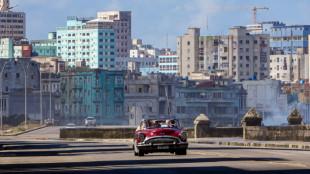 Emergency measures hobble Cuba as fuel supplies dwindle under US pressure
Emergency measures hobble Cuba as fuel supplies dwindle under US pressure
-
UK king voices 'concern' as police probe ex-prince Andrew over Epstein
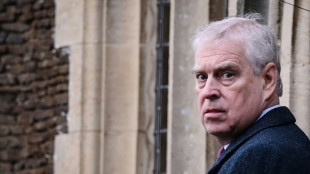
-
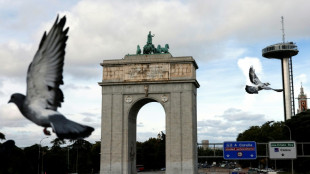 Spanish NGO says govt flouting own Franco memory law
Spanish NGO says govt flouting own Franco memory law
-
What next for Vonn after painful end to Olympic dream?

-
 Main trial begins in landmark US addiction case against Meta, YouTube
Main trial begins in landmark US addiction case against Meta, YouTube
-
South Africa open T20 World Cup campaign with Canada thrashing

-
 Epstein accomplice Maxwell seeks Trump clemency before testimony
Epstein accomplice Maxwell seeks Trump clemency before testimony
-
Discord adopts facial recognition in child safety crackdown

-
 Some striking NY nurses reach deal with employers
Some striking NY nurses reach deal with employers
-
Emergency measures kick in as Cuban fuel supplies dwindle under US pressure
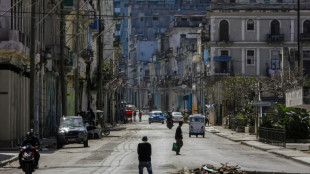
-
 EU chief backs Made-in-Europe push for 'strategic' sectors
EU chief backs Made-in-Europe push for 'strategic' sectors
-
Machado ally 'kidnapped' after calling for Venezuela elections

-
 Epstein affair triggers crisis of trust in Norway
Epstein affair triggers crisis of trust in Norway
-
AI chatbots give bad health advice, research finds

-
 Iran steps up arrests while remaining positive on US talks
Iran steps up arrests while remaining positive on US talks
-
Frank issues rallying cry for 'desperate' Tottenham

-
 South Africa pile up 213-4 against Canada in T20 World Cup
South Africa pile up 213-4 against Canada in T20 World Cup
-
Brazil seeks to restore block of Rumble video app

-
 Gu's hopes of Olympic triple gold dashed, Vonn still in hospital
Gu's hopes of Olympic triple gold dashed, Vonn still in hospital
-
Pressure mounts on UK's Starmer as Scottish Labour leader urges him to quit

-
 Macron backs ripping up vines as French wine sales dive
Macron backs ripping up vines as French wine sales dive
-
Olympic freeski star Eileen Gu 'carrying weight of two countries'

-
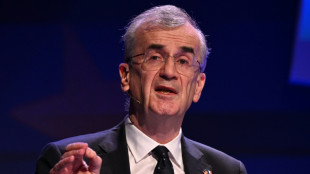 Bank of France governor Francois Villeroy de Galhau to step down in June
Bank of France governor Francois Villeroy de Galhau to step down in June
-
Tokyo stocks strike record high after Japanese premier wins vote


Wildfires upend Indigenous Canadians' balance with nature
Adrienne Jerome is heartbroken.
Her house survived Canada’s record wildfires this year, but everything that made her and many other Indigenous people in the area feel at home -- the spruce forests that enveloped her town, providing not just food but protection, everything from game to medicinal plants -- is gone.
"An evacuation in the middle of the night, with sirens blaring... it was a great shock," the former leader of this Anishinaabe tribe told AFP. "Children were crying and didn't want to leave their mothers.”
As they recover from this summer’s fires, isolated Indigenous communities surrounded by vast forests and often reachable only by air or a long, winding road are now facing big questions about their ability to maintain traditional ways of life.
"The forest that protects us has disappeared," Jerome says in a quavering voice.
"Our pantry has disappeared. There are no more small game animals, no hares, no partridges. All of the medicinal plants have burned."
All that remains now are blackened trunks.
A record number of wildfires, topping more 6,400 at last count, scorched almost 18 million hectares (nearly 70,000 square miles) this year, and forced thousands of Indigenous people to flee for their lives. Although they only represent five percent of Canada's population, they nevertheless constitute one in two evacuees.
Some communities had to evacuate multiple times over the spring and summer.
- 'Our church has disappeared' -
Wildfires are now "so dangerous and fast-moving" that evacuations are increasingly necessary, says Amy Cardinal Christianson, a Canadian Forest Service researcher who studies the effects of burns on Indigenous communities.
This poses particular challenges for remote northern villages with few or no links to Canada's large population centers in the south.
Anxieties are compounded by "a lack of trust that wildfire agencies will protect what the person or community values the most," says Christianson.
"That might be a trapline, a ceremonial site, a herd of cattle."
But the fires have become so big and numerous of late that authorities have been forced to prioritize saving homes in larger towns or cities under threat, over all else.
Everything Indigenous people do is rooted in "the forest, our territory," says Lucien Wabanonik, leader of the Lac-Simon community, his own home just steps from the woodland.
"Other people don't realize the loss that this represents for us. It's not a loss that we measure on a financial scale," he explains.
"Sacred sites, burials, meeting places have disappeared with the fire," he laments. "Our church had disappeared. It's an immense loss."
- 'It smells of death' -
This year marked the first time the Lac-Simon community had to evacuate due to forest fires.
Fires have flared in the region before but never on this scale: lightning sparked hundreds of fires at once during a weekend of storms in early June that lit up tinder dry forests.
"It smells like death," says Jerome, adding that she sobs when she thinks of all the wildlife that got trapped by advancing fires.
The community has mourned their deaths in several ceremonies.
At the same time, however, the fires have prompted renewed interest in reviving Indigenous practices that are currently curtailed.
Several Indigenous communities are calling for a return to prescribed burns to prevent wildfires, which involve setting a specific area on fire under controlled conditions to clear dead branches, brush and other materials that could become fuel for massive blazes.
Their ancestors used cultural burning practices for millennia, but there are legal barriers to who can do it now.
"These burns produce a mosaic on the landscape, creating or keeping meadows open, and promoting earlier succession forests with lots of deciduous trees that are less likely to cause crown fires," says Christianson.
Firefighters can use these "natural fire breaks to fight an out-of-control wildfire," she adds.
Adds Wabanonik, "a major shift must be taken."
S.F.Warren--AMWN



